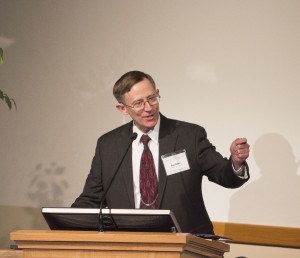
Ken Alford, a BYU professor of Church History and Doctrine, spoke about the recent history of establishing the gospel in Afghanistan, as part of BYU’s Church History Symposium on March 6.
“This is the first time the gospel has been established in a Muslim country, in a wartime setting.” Alford said of Afghanistan.
Proselyting currently cannot take place in Afghanistan; however, members of the Church living in Afghanistan are permitted to hold Church meetings. These members are mainly comprised of people serving with the military.
The Church has come a long way from 2001 to where it is now in Afghanistan. In 2001, small individual groups were organized to meet. It was difficult because there were no priesthood keys in the country.
In 2004, the organization began to improve and the first baptism recorded in Afghan Church history took place.
Corporal Alexandro Rangel was the first recorded baptism in the country of Afghanistan. Alford told Rangel’s story and his “battlefield baptism:”
White clothing was hard to come by in a war-zone. The request for white clothing for a LDS baptism among military chaplains was met with silence until a Catholic chaplain, Father Hubbs, said he had two white cleric robes, if they didn’t mind using Catholic robes. Another priest expressed his concern about the robes getting stained to which Father Hubbs replied, “If that happens, I could not think of a better cause.”
Men armed with weapons of war gathered around the baptism for safety. Rangel was then baptized a member of the LDS Church in the middle of a battlefield.
Today, each Church member in Afghanistan is assigned a “Mormon battle buddy.” The buddy acts as a home/visiting teacher and feels like a missionary companionship, Alford said. Buddies help each other avoid temptation and live the Word of Wisdom, which sometimes proves to be difficult since only six percent of water is safe to drink.
“The seeds of the gospel have been planted in Afghanistan,” Alford said. “Lives have been changed.”




